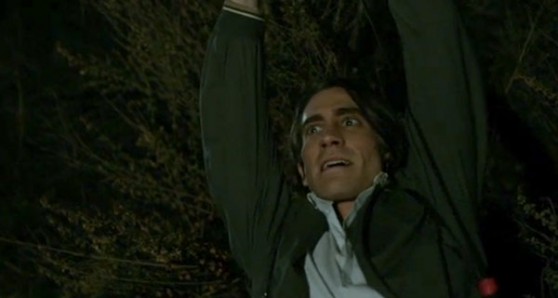10/31: Nightcrawler

Screen: Bold Films
What a performance by Jake Gyllenhaal — and what a performance by Dan Gilroy.
Gyllenhaal is fantastic in Nightcrawler, and not just because he lost dozens of pounds to give himself an absently cadaverous profile, though that’s a spot-on choice. Lou Bloom is, in a way, a fringier and more frightening extension of his Robert Goldsmith in Zodiac (with a shot of his Loki in Prisoners, my favorite thing about that shoutfest). But first-time director Gilroy kills it helming a screenplay he also wrote. To write sociopaths for film is not easy, because…okay, there’s a psych paper or textbook that Joe McGinniss quotes at length from in the closing passages of Fatal Vision, trying to get his arms around Jeffrey MacDonald’s pathology. The gist is that a sociopath initially presents as a functional person, but what makes a person a person, the conscience, the soul, is not there. Over time, you begin to notice gaps with a sociopath, bursts of unrecognizable code, static where an emotion is supposed to be, because a sociopath is not exactly a person but “a finely tuned reflex machine” (this is the phrase that’s stayed with me) built and tweaked to mimic human behavior in order to accomplish the sociopath’s monstrously selfish ends. Think Buffalo Bill copying his victim’s sobs and screams with an expression usually found at Monet exhibits; he’s interested, but he doesn’t care in the way you and I understand caring. He can’t.
That’s a serial killer, though; to write those, you just…write murders numbering more than three. Of course, most screen- and teleplays don’t content themselves with that and have to make the guy (or gal) a hyper-intelligent wag with a number of baroque tics and signatures (Red John, e.g.). Most sociopaths don’t kill people, is the thing, and to write those, you have to indicate differently. Gilroy’s indicating is fantastic. Lou doesn’t care about his personal safety. He parrots associate’s-degree self-improvement ideas; he doesn’t really understand them the way we do, but he does understand that, if he can execute on them somehow, he’ll get what he wants, and getting what he wants is the only thing he really does understand. He’s not interested in what anyone thinks of that, either. The shot’s the thing. The dialogue has a couple of hambones in it — I don’t entirely buy Lou’s dialogue in Rick’s last scene — but the way the script lets Gyllenhaal show us himself thinking is really well done. (And gives Bill Paxton pretty much the Bill-Paxtoniest line ever. “Fuck yew! Twarp.” Never change, Bill Paxton.)
Gilroy also directs a very impressive car chase, and gives us a bunch of process-y goodness about local news, how one becomes a “nightcrawler” who goes from crime scene to accident to fire with his camera and tries to beat the competition, what a news producer produces. He gets good performances from his actors, too; hat tip to his wife, Rene Russo, taking Nina inexorably from amusement to irritation to creeping dread when she realizes how well Louis has maneuvered her, and himself.
Great pic, confidently made. Get some.
Tags: Bill Paxton Dan Gilroy Fatal Vision Jake Gyllenhaal Joe McGinniss Nightcrawler Prisoners Rene Russo Riz Ahmed Robert Goldsmith Silence Of The Lambs The Mentalist Zodiac





I can’t wait to see this one.
Thanks for this review, as it helps me make a decision about this one. I made a vow a while back (after seeing the movie The Imposter) not to see any movies about sociopaths, violent or not. I don’t find they make very interesting watching, since to me there is ultimately no ‘there’ there… Combine that with the usual trail of people whose lives were hurt by them and I’ll pass…
[…] Sarah D Bunting @ Tomato Nation […]